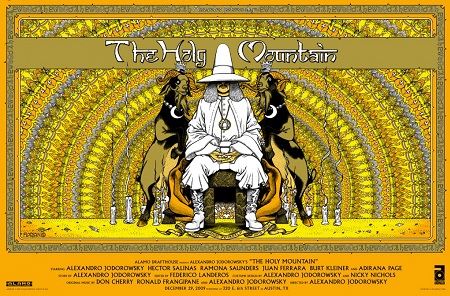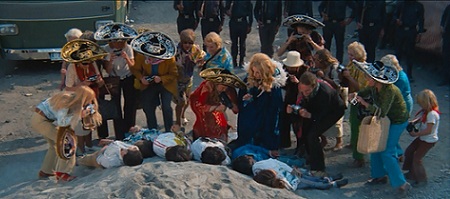The Holy Mountain

Narrative is the most powerful tool on the planet.
From personal anecdotes to sprawling epics of adventure, storytelling is the means by which the human race has made sense of existence. Which is important, because the human condition, when one takes the time to really break it down, is nothing short of baffling. We are evolved primates, cruising around the sun on a space-rock that hits 67,000 mile per hour, using technology we don’t even understand, and participating in societies founded by our ancestors. It’s goddamn insanity.
And I love it.
But what really gets me amped is the idea that art can help dispel the notion that the universe is nothing more than a giant abyss of nothingness and meaninglessness. It might be — I don’t know, I’m neither a philosopher nor an astrophysicist. But as I get older, I can’t kill the feeling that there are greater forces at play than I can ever possibly conceptualize or articulate.
Before words are put in my mouth, let me forewarn: I’m not declaring a newfound belief in God or revelation about the afterlife or some shit. My agnosticism is strong. What I am saying is that it’s pretty heavy to think of how much our lives can be changed, directed, and enlightened by stories. And what’s even heavier is the fact that, whether by clandestine design or sheer coincidence, there are connections amongst the storytellers, the viewers, and the content.
I have ascended The Holy Mountain and can attest that it is a strange, wonderful place.
A week ago, I had never even heard of Alejandro Jodorowsky or his 1973 film. Today, I have watched The Holy Mountain a couple of times and find it to be amusing, confusing, frightening and enlightening. This movie is set in an anachronistic cross-breed of biblical holy lands and retro-sci-fi speculations. We follow a Thief through various psychedelic scenarios that are both bizarre and thought-provoking. While these images can easily be written off as the incoherent musings of a drug-addled director, a little bit of examination goes a long way to prove otherwise.

Take, for instance, an early scene in which military forces slaughter civilians. Rather than being repulsed or trying to help, tourists flock to the dead bodies to snap photographs and enjoy the spectacle. At first glance, the scenario seems absolutely unfathomable; no one would run headfirst into a disaster for entertainment, right? But then when we step back and think about it…trivializing tragedy is ubiquitous at this point. The Gulf War, Hurricane Katrina, 9/11, the BP oil spill, and an innumerable number of other events have been transmuted from real-life catastrophes into televised drivel.
Watch it. Shed a tear. Forget it. Move on to the next movie-of-the-week. And never admit that you enjoyed it
The Holy Mountain is rife with these types of analyses, hidden behind a solid veneer of drug-inspired imagery. Truthfully, the role that drugs played in the film’s production was part of what piqued my interest. Jodorowsky underwent months of “spiritual training” prior to the film’s production. Of course, in the 1970s spiritual development was a euphemism for doing LSD with strange dudes. I wanted to see what could be produced under such conditions, and I was both surprised and intrigued by what I saw.
To me, The Holy Mountain really picks up when the Thief meets the Alchemist in the liminal space between Heaven and Earth. No, you don’t need to know exactly what’s going on. The Alchemist explains that in order to pursue immortality, the Thief must join up with a bunch of peeps and head for the Holy Mountain. His comrades are the most influential members of society, industrialists and capitalists and the big-wig decision-makers. Each of these figures represents a planet and gets a segment showing what they’re all about.
Check out Isla, who represents Mars. Her segment is filled with wonders such as psychedelic shotguns, rock-and-roll weapons, and a slamming soundtrack:
The Thief and his astrological cohorts travel to the Holy Mountain. Once there, the Alchemist reveals that the entire journey was an illusion, a bit of misdirection necessary to stumble upon true enlightenment.
I promised you the great secret and I will not disappoint you. Is this the end of our adventure? Nothing has an end. We came in search of the secret of immortality, to be like Gods. And here we are, mortals, more human than ever. If we have no obtained immortality, at least we have obtained reality.
The Holy Mountain is a weird parable of self-discovery and social awareness. Could I be applying my own thoughts onto the film, placing meaning where there is none otherwise? Absolutely. That’s probably the case. But I can’t shake the feeling that the movie, in spite of its altered state, is really trying to inform us of our own conditions. We live crazy, shocking, and inspiring lives but fail to recognize them as such. Sometimes it takes a trippy flick about searching immortality to remind us of that.
A familiar story, told in an unfamiliar way.
Oh! Before I forget! If I weren’t already being encouraged in all the wrong ways, after watching the movie I decided I wanted to look up a live Mastodon video. I found a performance of Capillarian Crest from the Unholy Alliance tour. Guess what the intro tape for the song includes. That’s right, a quote from the motherfuggin’ Holy Mountain. Coincidence? Probably. But what if…



